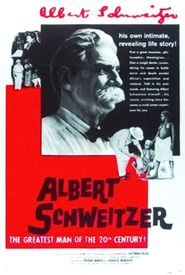Here is the biography of Albert Schweitzer:
Albert Schweitzer was born on January 14, 1875, in Kaysersberg, near Strasbourg, Elsass-Lothringen, Germany (now in Alsace, France). His father and both grandfathers were pastors and organists. His family had been devoted to education, religion, and music for generations.
Schweitzer took music lessons from his grandfather, a church organist. He spoke German and French in his bilingual Alsace family and later added English to his studies. From 1893-1899 he studied philosophy and theology at the University of Strasbourg, University of Berlin, and the Sorbonne. In 1899 he completed a doctorate dissertation on the philosophy of Immanuel Kant. From 1905-1912 he studied medicine in Strasbourg and Paris, and received his MD degree in tropical medicine and surgery in 1912.
From the age of 9 Schweitzer started regular performances of organ music in his father's church and continued his organ recitals until the age of 89. In 1905 he wrote a biography of Johann Sebastian Bach, in French, then he rewrote and updated the Bach book--in German--in 1908, the version considered definitive. Schweitzer also published a book on organ building and playing in 1906. He was involved in the restoration of many valuable historic organs worldwide, including construction of the organ at his hospital in Lambarene, where he played music for his patients.
In 1905 he began his medical studies at the University of Strasbourg, because he decided to go to Africa as a medical doctor rather than a pastor. His medical knowledge was in urgent need during an epidemic of sleeping sickness there. In 1913 he obtained his MD degree, but was turned down by the Paris Missionary Society because his very liberal views of Christ's teachings did not conform to the Society's orthodox beliefs. Schweitzer and his wife went to Lambarene, French Equatorial Africa (now Gabon),and started a hospital in a tent, gradually adding rooms for special cases of sleeping sickness, leprosy, pediatrics, and surgery. After his release from French internment Schweitzer practiced medicine in Strasbourg from 1918-1923. In 1924 he returned to his hospital in Lambarene, which was to be restored after years of decay during his absence.
Schweitzer gained great reputation for writing "The Quest of the Historical Jesus" (1906). He was acclaimed for his two concise books on Bach in 1905-1908. In 1917 Schweitzer and his wife were arrested by the French administration in Africa for being Germans, and sent to a French internment camp at the St. Remy mental institution. There Schweitzer was kept at the same room where Vincent Van Gogh lived before his suicide. The Schweitzers were prisoners of war until the end of the First World War in 1918.
Schweitzer saved lives by his medical work, by writing and teaching, and by advocating for peace and nuclear control. He admittedly followed the similar line as that of the Russian humanitarian and writer Lev Tolstoy. As the founder of a free public hospital, a writer, and humanitarian, Schweitzer became the leading proponent of accessible medicine for all. He was also involved in the foundation of the Goethe Institute. From 1952 until his death Schweitzer worked against nuclear weapons together with Albert Einstein and Bertrand Russell. On December 10, 1953, Schweitzer was awarded the Nobel Peace Prize. He donated his prize money to build a leprosy clinic in Lambarene. In 1957 Schweitzer co-founded The Committee for a sane Nuclear Policy.
Schweitzer was a multifaceted person, a true Renaissance man. He was a doctor, a pastor, a teacher, a writer, a musician, a father, and husband, an international lecturer, and the leading proponent of peace, all at the same time. He admired all people as brothers and sisters. His openness and helpfulness to strangers was disarming and ennobling. He was learning from simple people through his entire life, being himself patient, modest, and humble. "Why are you traveling in the 4th class?" some official asked him - "Because there is no 5th class", answered Schweitzer.
His humor was legendary. His look resembled that of his friend Albert Einstein. Once on a train he was asked by two schoolgirls, "Dr. Einstein, will you give us your autograph?" He did not want to disappoint them, so he signed their autograph book: "Albert Einstein, by his friend Albert Schweitzer."
He died on September 4, 1965, in the hospital, which he founded in 1913, and was laid to rest in the ground of his hospital in Lambarene, Gabon.























